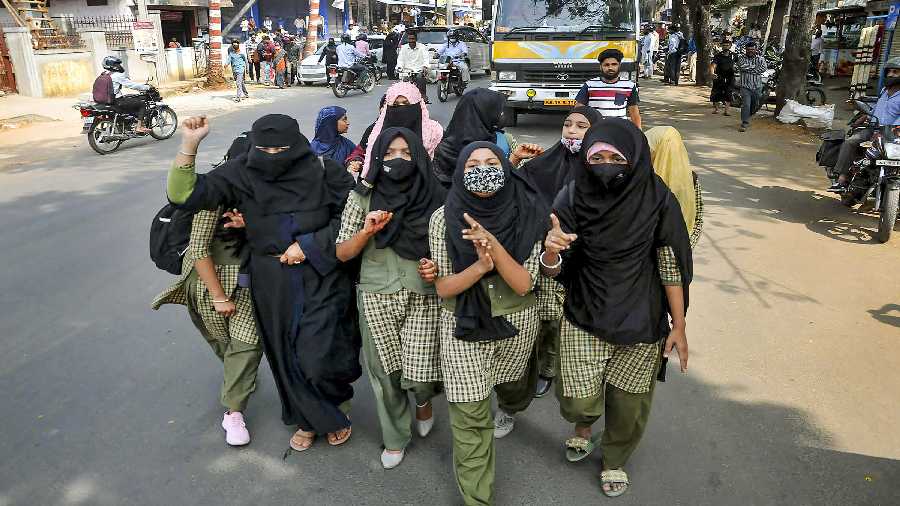The Supreme Court will take up next week a batch of petitions seeking urgent hearing of the challenge to the Karnataka High Court order upholding the hijab ban in educational institutions and the observation that wearing the headscarf was not an essential Islamic practice.
“Others (advocates) have mentioned it too. We will post it next week after the Holi vacation,” Chief Justice of India N.V. Ramana told senior advocate Sanjay Hegde, appearing for some students who have approached the apex court against the high court order. Hegde had urged the bench, which also had Justice A.S. Bopanna, for early listing, at least by Monday.
The senior counsel pleaded that the matter be heard on a priority basis.
The Supreme Court will be on a short recess from Thursday on account of Holi and will reopen on Monday.
On Tuesday, a three-judge bench of the high court had ruled that wearing the hijab was not an essential practice in Islam and preventing its use in educational institutions was a reasonable restriction on the freedom of speech and expression.
“Prescription of school dress code to the exclusion of hijab, bhagwa, or any other apparel symbolic of religion can be a step forward in the direction of emancipation and more particularly, to the access to education.
“It hardly needs to be stated that this does not rob of the autonomy of women or their right to education in as much as they can wear any apparel of their choice outside the classroom,” the high court had said while upholding the Karnataka government’s order dated February 5 banning the hijab and other religious clothing in educational institutions.
One of the special leave petitioners before the Supreme Court has assailed Tuesday’s judgment on the ground that “the Hon’ble High Court has erred in creating a dichotomy of freedom of religion and freedom of conscience wherein the Court has inferred that those who follow a religion cannot have the right to conscience”.
It was submitted that the high court had failed to note that there does not exist any provision in law that prescribes a punishment for students for not wearing uniforms.
“Even if one were to presume that there existed a mandate to wear a particular uniform, there is no punishment prescribed in case a student does not wear the uniform,” the appeal by one of the girl students stated.
According to the petitioner, the judgment has failed to note that the right to wear the hijab comes under the ambit of the right to privacy under Article 21 of the Constitution as the freedom of conscience forms a part of that right.
It was submitted that any infringement of the freedom of conscience has to be seen in the context of the “triple test” laid down by a nine-judge constitution bench in the 2019 K.S. Puttaswamy vs. Union of India case. The “triple test” requires that to constitute a valid infringement of privacy, there must be the existence of a relevant law, a legitimate state interest and the law must be proportionate.











